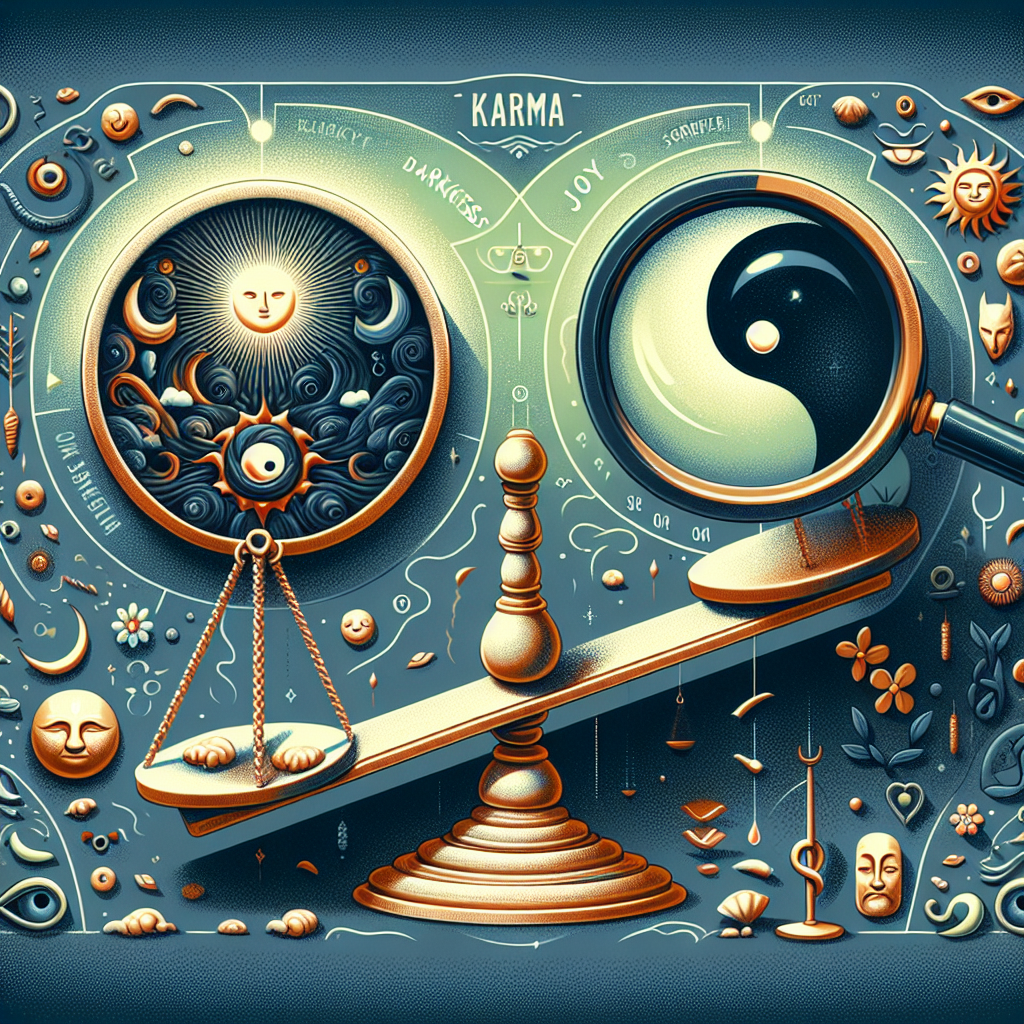Understanding Karma
Karma is a term that originated in ancient India and is often associated with Hinduism, Buddhism, and Jainism. It denotes the principle of cause and effect, where every action has consequences that will ultimately return to the doer. This philosophical and spiritual concept is foundational to many Asian spiritual traditions and has garnered interest in the West as well. It illustrates how one’s actions—good or bad—will lead to positive or negative outcomes, shaping one’s future experiences.
Historical Context of Karma
The concept of karma can be traced back thousands of years in Indian philosophy and is intricately linked with the doctrines of reincarnation and the moral law of cause and effect. The earliest references to karma appear in the Vedic texts, where it was associated with rituals and moral duties.
- Vedic Texts: The Vedas, ancient scriptures of Hinduism, mention karma in the context of rituals and sacrifices.
- Upanishads: This philosophical subset of Vedic literature emphasizes the inner meaning of karma and its connection to the soul’s journey.
- Buddhism: The Buddha reformulated the idea of karma, stressing intention behind actions rather than just the actions themselves.
- Jainism: Jain philosophy holds a unique interpretation of karma, depicting it as a physical substance that attaches to the soul and influences its progress towards liberation.
The Mechanics of Karma
At its core, karma operates under the basic principle: every action has a reaction. This reaction does not manifest immediately; it can transcend lifetimes, linking the past, present, and future. Understanding karma involves a nuanced exploration of actions, intentions, and the resultant consequences.
Positive and Negative Karma
Karma can be divided into two primary categories:
- Positive Karma: This is accrued from good actions, intentions, and thoughts. It leads to favorable outcomes in the future, such as happiness, success, and prosperity.
- Negative Karma: This arises from harmful actions or selfish intentions, leading to adverse consequences, suffering, or difficulties in future experiences.
The Role of Intent
Intent plays a crucial role in the karmic process. In Buddhism, for instance, the karma resulting from actions reflects the intention behind them. A positive intention behind an action amplifies the good karma, while a negative intention can lead to greater negative karma, even if the action appears neutral or positive on the surface.
Karma and Reincarnation
The connection between karma and reincarnation is pivotal in many Eastern philosophies. According to these beliefs, the actions and decisions made in one life directly influence the circumstances and experiences in successive lifetimes. This cyclical journey promotes moral responsibility, as individuals are urged to act ethically to create a positive future.
The Cycle of Samsara
This cycle of birth, death, and rebirth, known as Samsara, illustrates how karma operates over multiple lifetimes. The ultimate goal in many spiritual traditions is to break free from this cycle and attain liberation (Moksha in Hinduism, Nirvana in Buddhism), a state of eternal peace and enlightenment.
Real-Life Applications of Karma
While karma has deep metaphysical roots, it finds practical relevance in everyday life. The framework of cause and effect encourages individuals to make conscious choices regarding their actions, fostering a sense of personal responsibility, compassion, and ethical behavior.
Karma in Relationships
The essence of karma emphasizes the importance of empathy and kindness in our interactions. Treating others well builds positive relationships and contributes to the accrual of good karma, enhancing social harmony and personal fulfillment.
Karma in Personal Growth
Understanding karma encourages self-reflection and accountability. By examining our actions and their impacts, we foster personal growth and continuous improvement, cultivating a life aligned with positive intentions and ethical values.
Scientific Perspectives on Karma
While karma is primarily a philosophical concept, some modern interpretations draw parallels with scientific principles of cause and effect. Fields such as psychology and ecology illustrate how actions (even inadvertent ones) generate reactions that affect individuals and communities alike.
Psychological Underpinnings
Research in psychology suggests that acts of kindness and compassion lead to positive emotional and psychological benefits for both the giver and receiver. This symbiotic relationship exemplifies the karmic cycle, encouraging a more profound understanding of well-being through interconnectedness.
Ecological Connections
Ecologically, the principle of karma resonates with the understanding of environmental impact. Actions taken toward conservation and sustainability yield positive ecological outcomes and promote a harmonious relationship between humans and nature. Negative actions, conversely, lead to environmental degradation, showcasing a literal interpretation of cause and effect.
Contemporary Misconceptions about Karma
As karma has infiltrated popular culture, several misunderstandings have emerged. These misconceptions can distort the true essence of karma, reducing it to simplistic notions of punishment and reward.
Karma as Retribution
One prevalent misconception is viewing karma primarily as a system of retribution where bad actions are met with immediate punishment. In reality, karma is more about the overall journey of the soul and the cumulative effect of one’s actions over a lifetime or beyond, rather than an instant penalty for wrongdoing.
The “Karma” Trend in Pop Culture
The concept of karma has also been commodified in pop culture, often leading to clichés detached from their philosophical roots. This superficial understanding can diminish the profound implications of mindful living and accountable actions, making it crucial to explore deeper nuances.
Choosing a Karmic Path: How to Cultivate Good Karma
Recognizing the significance of karma can be transformative. Here are practical steps to cultivate good karma in daily life:
- Practice Mindfulness: Being aware of your actions and their implications on others fosters a more intentional life.
- Show Compassion: Engage in acts of kindness and charity, cultivating a compassionate mindset.
- Make Ethical Choices: Ultimately, align your actions with your values, prioritizing ethics in personal and professional decisions.
- Reflect Regularly: Incorporate self-reflection into your routine to understand your motivations and their karmic implications.
Conclusion
The essence of karma transcends mere philosophical discourse; it introduces a profound understanding of human responsibility and interconnectedness. By grasping the principles of cause and effect, individuals can navigate their lives with intentionality, fostering environments of compassion, empathy, and growth. Embracing the karmic journey invites us to reflect on our actions while inspiring us to create positive ripples in the world around us, shaping not just our destinies but those of others as well.
FAQs
What is karma?
Karma is the principle of cause and effect, where every action has consequences that impact the doer in the present or future. It is rooted in various philosophical and spiritual traditions, promoting moral responsibility.
Is karma always immediate?
No, karma does not always manifest immediately. The effects of actions can ripple through time and even affect future lifetimes, emphasizing a broader perspective on one’s actions and their consequences.
Can karma be changed or influenced?
Yes, individuals can change their karma through conscious actions, positive intentions, and personal accountability. By making ethical choices and engaging in acts of kindness, one can cultivate good karma.
Do all religions believe in karma?
While the concept of karma is most prevalent in Hinduism, Buddhism, and Jainism, similar ideas of moral cause and effect exist in other spiritual traditions, though they may not use the term “karma” explicitly.
How can I cultivate good karma?
Good karma can be cultivated through mindfulness, compassion, ethical decision-making, and regular self-reflection on one’s actions and intentions.
https://open.ai/741fddbf2ade3a1c3084e4994d39abec , It seems you mentioned “Prompt.” Could you please clarify what you’re looking for? Are you seeking a writing prompt, assistance with a specific topic, or something else? Let me know how I can help!, #Essence #Karma #Deep #Dive #Effect, #Essence #Karma #Deep #Dive #Effect, 1734028609, the-essence-of-karma-a-deep-dive-into-cause-and-effect





